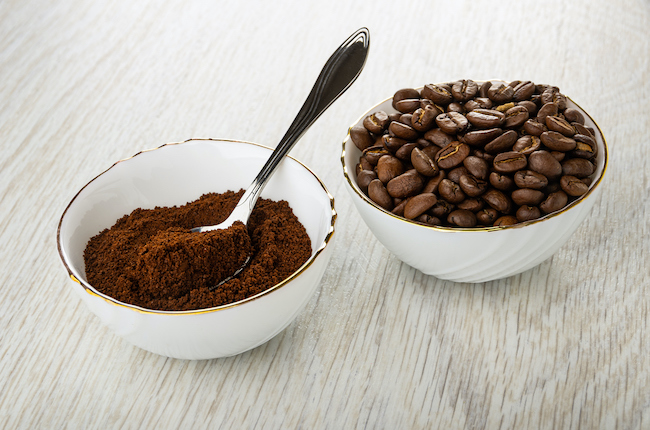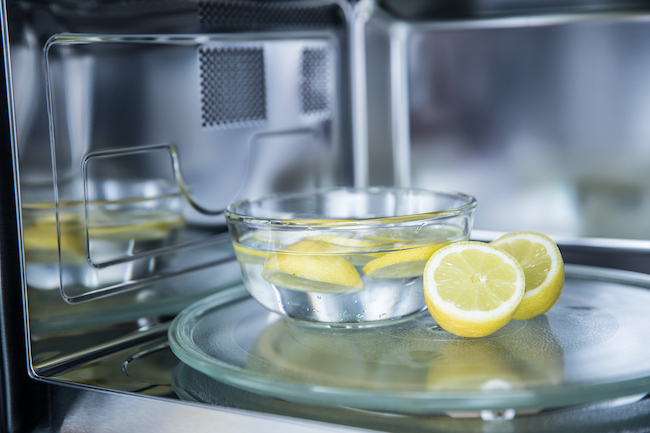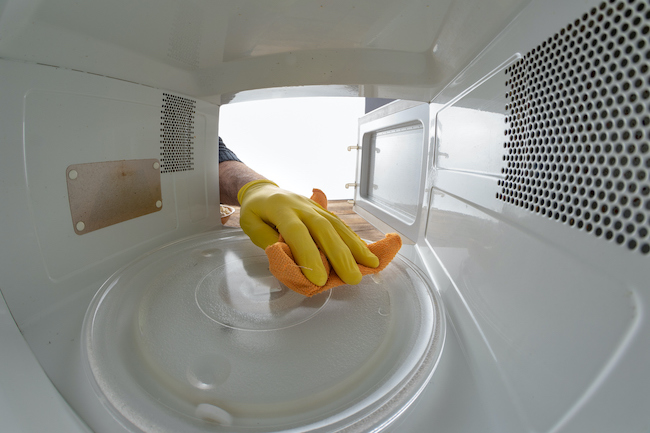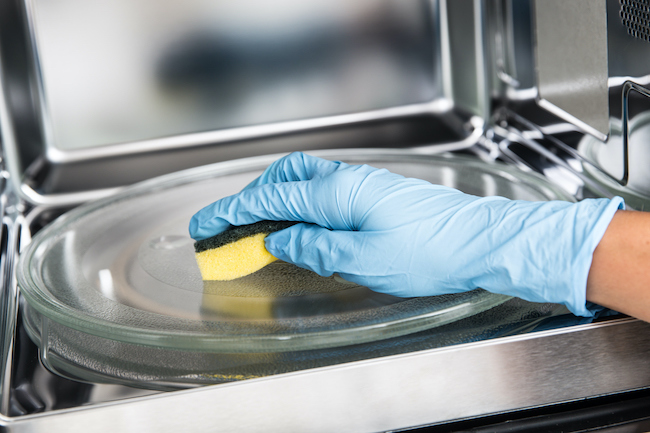We may earn revenue from the products available on this page and participate in affiliate programs. Learn More ›
Microwaves are one of the most used kitchen appliances. From heating to cooking, they are a staple for people who don’t know a thing about food preparation and even for those who are master chefs. But with frequent use comes mess, splatters, and unpleasant odors that are difficult to budge, even with frequent cleaning. If your microwave smells a little funny, even after you’ve cleaned it, try one of these DIY odor-busting solutions.
Vinegar and Baking Soda
These pantry staples represent two of the most common solutions for fighting bad smells. Gather your ingredients, plus a clean sponge. Soak the sponge in plain white vinegar and sprinkle baking soda on top. Place the sponge in the center of the microwave and heat for 20-30 seconds. When the timer stops, scrub the inside of the microwave using the same sponge. Rinse the interior with water and soap and wipe it dry with a dish cloth or paper towel.
Baking Soda
If you’re all out of white vinegar, you can also remove odors with just baking soda. After you’ve cleaned the inside of the microwave, place an open box of baking soda inside. Alternatively, pour a generous amount of baking soda from the box into a bowl. Let the baking soda sit overnight.
Vinegar and Water
Mix equal parts water and vinegar in a bowl. Dip a clean sponge into the mixture and use it to wipe your microwave clean. Rinse the sponge clean and leave it to dry. Take another bowl and pour half a cup of vinegar in it. Leave the bowl inside the microwave overnight. The next day, rinse the microwave with soap and water and dry it with a clean dish cloth.

Coffee
Coffee is one of the most effective natural air fresheners that might already be sitting in your fridge or pantry. Let it work its smell-busting power on the microwave by putting two tablespoons of ground coffee in a microwave-safe mug with half a cup of water. Heat the mug for 2-10 minutes, making sure that the coffee solution doesn’t boil. To prevent the coffee mixture from boiling, heat for 2-3 minutes at a time, allowing the cup to cool a bit before continuing to heat. Check the water level, as you heat. If it evaporates, add more as needed. After heating for a total of 10 minutes, remove the cup.
Most of the time, the smell gets removed after 10 minutes of heating the coffee solution. If the smell is still there, repeat the heating process until it’s gone.
Coffee and Baking Soda
Coffee can also be mixed with baking soda to fight odors. To make this DIY solution, mix equal parts baking soda and coffee grounds in a bowl or on a plate. Let it sit inside the microwave overnight.

Lemons
Fresh lemon juice can help remove many kinds of odors, plus it possesses antibacterial properties. Cut a lemon in half and squeeze the juice into a bowl. Add half a cup of water, and place the lemon rinds inside the bowl. Leave the bowl in the microwave overnight.
Oranges
If you don’t have lemons at home, you can use oranges instead. Slice two oranges in half and put the fruit in a microwave-safe bowl with two cups of water. Place the bowl inside the microwave and heat it for 4-5 minutes. Check every two minutes to see if the water is boiling and turn off the heat as needed to keep the water from spilling over. After heating the orange and water mixture, leave the bowl inside the microwave for at least 30 minutes (overnight is even better) to fully absorb bad odors. After letting it sit, remove the bowl and wash the microwave with water and dish soap.
Berries
Berries are another ingredient with antibacterial properties. That quality, along with their fruity scent makes them a good candidate for freshening your microwave. Put a generous handful of berries in a microwave-safe bowl. Cover the bowl with a microwave-safe cover and heat it for 1-2 minutes. After heating, leave the bowl in the microwave for 15 to 30 minutes to allow the fresh smell to cover up bad odors.
Vanilla Extract
Vanilla extract gives baked goods a fragrant aroma, and brings the same pleasant scent to household cleaning projects. While vanilla extract is more expensive than some of these other pantry cleaners, if you have extra vanilla extract at home, you can use it to mask bad microwave odors. Put four teaspoons of vanilla extract in a microwave-safe bowl and mix it with two cups of water. Heat it for a few minutes or until the mixture starts to boil. Once the water bowls, turn off the microwave but leave the bowl inside. After 30 minutes, remove the bowl and wipe the inside of the microwave.
Cloves
Another spice with odor-absorbing properties is cloves. In a small microwave-safe bowl, pour 1/4 cup of ground cloves and place the bowl in the microwave. Leave it sitting in the microwave overnight or during the times you aren’t using the microwave. This technique will help absorb the bacteria and the stink of a smelly appliance.

Rubbing Alcohol
It’s not just for first aid! Rubbing alcohol can remove bad smells from your microwave. Dab rubbing alcohol onto cotton balls or a clean cloth then use them to wipe the interior of your microwave. Afterwards, wipe it clean with soap and water. When the smell is gone, leave the door open to air dry.
Charcoal
Charcoal is great at absorbing moisture and odor from appliances, which is why it is often placed inside the fridge. You can also use this material in your microwave for stink-fighting power. Cut pieces of charcoal and place them in a bowl. Leave the bowl inside the microwave overnight so the charcoal has time to absorb the bad smells. If the smells aren’t gone by morning, keep the charcoal inside the microwave whenever it’s not in use.
With these DIY techniques for removing bad smells from microwaves, you don’t have to buy expensive fresheners, and can instead use ingredients you already have on hand.
A Few Notes on Cleaning Your Microwave
Some people wait for their microwave to stink before they clean it. However the best way to maintain this kitchen workhorse and fight odors before they happen is to clean it once a week. Regular cleaning fights stains and prevents food smells from sticking to the interior of the microwave.
A version of this content was originally published at Kitchenistic.com.

